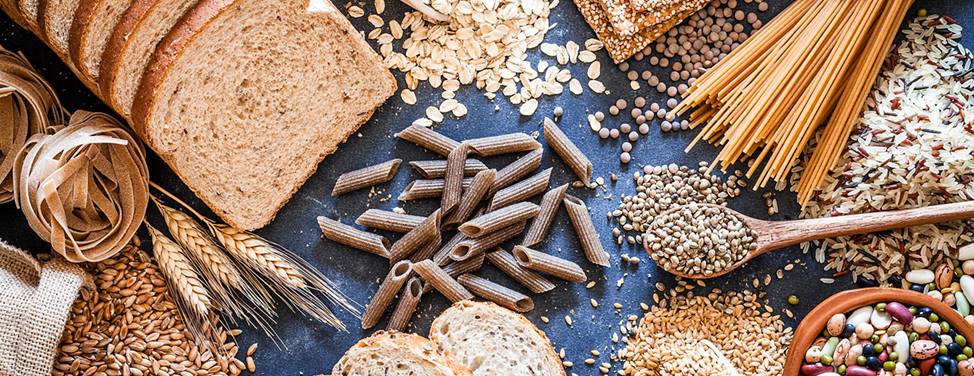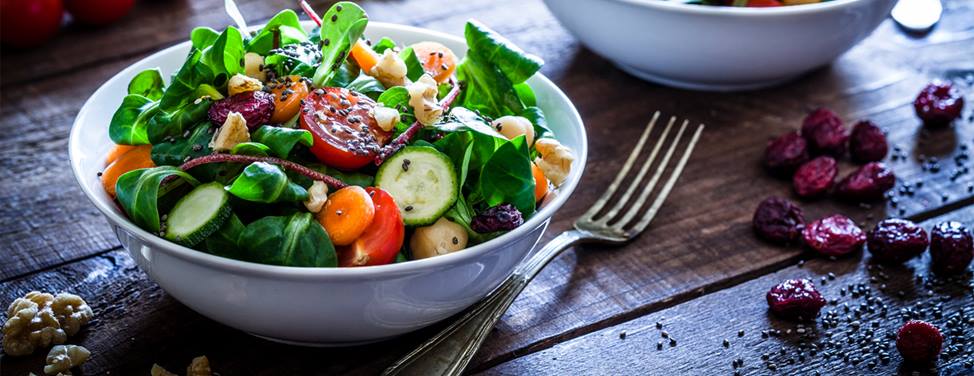
Carbohydrate Distribution
The foods listed below all contain carbohydrates which turn into a sugar called glucose during digestion. Foods with carbohydrates should be eaten in appropriate amounts and distributed throughout the day. This is especially important if you have diabetes.
The following information about food portions and carbohydrate grams can help you to count the amount of carbohydrates that you eat.
Fruit: 15 grams of carbohydrate
- Small apple, orange, peach, pear
- 1/2 banana
- 17 grapes
- 3 prunes
- 1/2 grapefruit
- 1/2 cup of mango or fruit cocktail
- 1 cup cantaloupe or papaya
- 1¼ cups watermelon or strawberries
- 2 tbsp raisins
- 3/4 cup of blackberries or blueberries
Milk & Yogurt: 15 grams of carbohydrate
2/3 cup plain yogurt or yogurt sweetened with aspartame, sucralose or stevia.
Starches, Cereals, Grains: 15 grams of carbohydrate
- 1 ounce (about 1 slice) bread and bread products
- 1/2 English muffin or hamburger bun
- 1/2 cup of potato, corn, peas, yams
- 1⁄3 cup cooked spaghetti, noodles, pasta
- 1/2 cup serving cooked oatmeal, grits, kasha
- 1/2 cup serving cooked barley, bulgur
- 1⁄3 cup serving cooked rice, millet or quinoa
- 1/2 cup serving cooked legumes (dried beans, peas)
- 6 inch size tortilla
- 3 cups popcorn
- 6 saltines crackers
- 3 graham cracker squares
Vegetables: 5 grams of carbohydrate
- 1/2 cup cooked, 1 cup raw
- Garden vegetables: broccoli, cauliflower, carrots, green beans, asparagus, tomatoes, zucchini, beets, eggplant, mushrooms, cabbage, Brussels sprouts, celery, cucumbers, cooked greens, okra, bell peppers, snow peas, Swiss chard
Tips to improve blood sugar levels
- Eat about the same amount of carbohydrates at each meal. Distribute your foods into 3 meals about 4 to 6 hours apart. If you are hungry between meals have a small snack.
- Fruit is naturally sweet so you should limit to one serving at a time.
- Meats, chicken, fish, eggs, cheese, tofu, cottage cheese, nuts, oils and fats don’t raise your blood sugar but do contribute calories.
- Choose sugar-free options: diet sodas, sugar-free Jello, Crystal Light, mineral water, tea, coffee, sugar-free popsicles, Equal, NutraSweet, Splenda, Sweet'n Low or Truvia.
Your dietitian can help you choose a carbohydrate plan that is right for you.
UCSF Health medical specialists have reviewed this information. It is for educational purposes only and is not intended to replace the advice of your doctor or other health care provider. We encourage you to discuss any questions or concerns you may have with your provider.










